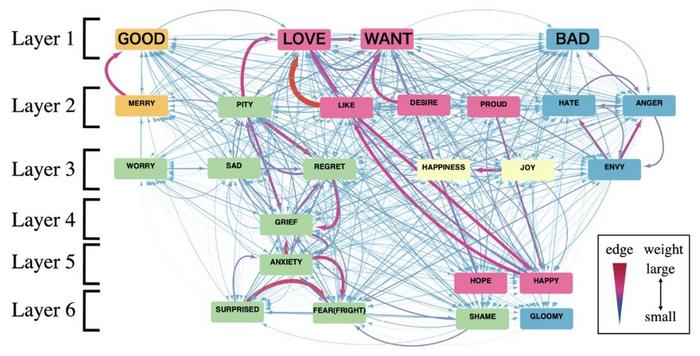Emotions exert a profound influence on human behavior, prompting extensive explorations in the realms of psychology and linguistics. Understanding central emotions also has practical utility since it can help organizations create messages that resonate better with people. For instance, businesses can enhance their connection with their customers, and non-profits can prompt quicker action by skillfully leveraging the salient emotions in humans.

Credit: Mitsuki Fukuya from Tokyo University of Science
Emotions exert a profound influence on human behavior, prompting extensive explorations in the realms of psychology and linguistics. Understanding central emotions also has practical utility since it can help organizations create messages that resonate better with people. For instance, businesses can enhance their connection with their customers, and non-profits can prompt quicker action by skillfully leveraging the salient emotions in humans.
Colexification is a phenomenon in which the occurrence of a single word is associated with multiple concepts that share semantic relationships. The analysis of colexification is an innovative linguistic method for indirect semantic associativity analysis, leveraging existing semantic relations without the need for additional data.
In a groundbreaking discovery, researchers from Japan have identified emotional hubs that exist across languages. Their work, published online in Scientific Reports on December 09, 2023, analyzed word associations by employing a “colexification network” and revealed that the emotion-related concepts “GOOD,” “WANT,” “BAD,” and “LOVE” have the highest number of associations with all other words that represent emotions.
The researchers, including Dr. Tohru Ikeguchi, Ms. Mitsuki Fukuya, and Dr. Tomoko Matsumoto from the Tokyo University of Science, and Dr. Yutaka Shimada from Saitama University, built a network by connecting concepts in several languages. In doing so, they ensured that the connection between two words represented the strength of colexification. “Colexification is the phenomenon of a single word with multiple concepts. For example, the Spanish word “malo” has two meanings “BAD” and “SEVERE.” It means that the two concepts of “BAD” and “SEVERE” are colexified in Spanish. In this paper, by focusing on colexification, we succeeded in detecting central emotions that share semantic commonality with many other emotions,” explains Dr. Ikeguchi, the lead author of the study.
In a discovery that affirms the universality of their findings, the team discovered that three of the four emotions they identified are identical to core emotions discovered through traditional semantic methods and the natural semantic metalanguage (NSM), which corresponds with their previous study findings. In this context, Dr. Ikeguchi notes, “To identify the semantic primes, NSM researchers studied numerous languages using traditional semantic methods. Intriguingly, the set of semantic primes includes three of our four central emotion-related concepts: ‘GOOD,’ ‘BAD,’ and ‘WANT.’ This agreement supports our conclusion that the central concepts identified by colexification analysis could be shared by many languages rather than specific to English“.
The findings of this study may offer novel insights into the evolution of languages and cross-cultural communication since words are considered to be intricately connected to emotions. The outcomes gain significance amid the increasing importance of comprehending natural language processing. As Dr. Ikeguchi explains, “Concepts associated with sentiments or emotions play an important role in the field of natural language processing, particularly sentiment analyses. The analysis methods enable us to identify semantically positive and negative orientations of written texts and have various applications in the real world.“
A better understanding of natural language processing will also aid in the development of language processing algorithms and large language models (LLMs). LLMs are now used extensively for information processing and content generation. Globally, there is a trend of increasing investments aimed at enhancing and refining these models. Therefore, the findings of this study may have useful implications for the future of online communication.
***
Reference
DOI: https://doi.org/10.1038/s41598-023-48922-8
About The Tokyo University of Science
Tokyo University of Science (TUS) is a well-known and respected university, and the largest science-specialized private research university in Japan, with four campuses in central Tokyo and its suburbs and in Hokkaido. Established in 1881, the university has continually contributed to Japan’s development in science through inculcating the love for science in researchers, technicians, and educators.
With a mission of “Creating science and technology for the harmonious development of nature, human beings, and society,” TUS has undertaken a wide range of research from basic to applied science. TUS has embraced a multidisciplinary approach to research and undertaken intensive study in some of today’s most vital fields. TUS is a meritocracy where the best in science is recognized and nurtured. It is the only private university in Japan that has produced a Nobel Prize winner and the only private university in Asia to produce Nobel Prize winners within the natural sciences field.
Website: https://www.tus.ac.jp/en/mediarelations/
About Professor Tohru Ikeguchi from Tokyo University of Science
Dr. Tohru Ikeguchi is a professor at the Department of Information and Computer Technology at the Tokyo University of Science. Professor Ikegachi has published nearly 178 scientific articles in areas such as Nonlinear Dynamics and Chaos, Nonlinear Time Series Analysis, Network Science, Computational NeuroScience, Application of Chaotic Neurodynamics for Solving Combinatorial Optimization Problems, . He has previously worked at Universite de Louis Pasteur and Saitama University, and has been cited multiple times.
Journal
Scientific Reports
DOI
10.1038/s41598-023-48922-8
Method of Research
Computational simulation/modeling
Subject of Research
Not applicable
Article Title
Central emotions and hubs in a colexification network
Article Publication Date
9-Dec-2023
COI Statement
The authors declare no competing interests.




